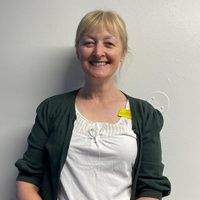Before you watch this webinar
Enhancing your learning experience begins with understanding you better. Collecting data enables us to tailor our educational content specifically for our audience. Discover more about how we handle your information in our Privacy Policy.
Event
Remote symptom management during COVID-19
Our sponsor

Case discussion:
During a remote telephone annual review a 56-year old woman with SPMS describes increasing urinary frequency and three UTIs in the last 6 months, which were managed by her GP. She is finding that she has more problems with constipation and one episode of incontinence for which she is really upset.
How are you going to support this lady, manage these symptoms remotely and improve her quality of life?
Objectives for the webinar:
This webinar will deal with practical issues related to the validation of remote assessments and symptom management of MS-related symptomatic problems using bladder dysfunction as an exemplar. How can we make this effective?
- PwMS experience of remote assessment during COVID, and how this may vary dependant on type of MS
- How have we become remote clinicians? Remote management of disease modifying therapies and the annual review. What does/does not work?
- A greater understanding of the NHS future plan and timelines for transforming neurology services
Webinar slides
Summary
MS teams should take what they have learnt about delivering remote care during the pandemic and use it to improve their services. That was the opinion of the speakers during this discussion session.
Proactive self-management
Sue Thomas said that MS teams should anticipate symptoms in people with secondary progressive disease, priming patients to recognise problems and seek early help.
This is when digital applications and remote communication technologies can help to support self-management, she went on. Apps can track adherence to treatment, as well as changes in bowel habits, activity levels, and mood.
Helping patients to manage such issues not only improves quality of life, it also saves money, Sue said. According to Hospital Episode Statistics (HES) data, in 2019/20 there were 30,000 emergency hospital admissions among people with MS, costing the NHS £86million. Bladder and bowel issues were responsible for £9million of this total, and UTIs accounted for 10% of the admissions.
“That adds up to a lots of nurse specialist or continence advisor posts. So why aren’t we being more proactive?”, asked Sue.
Skills and confidence
Part of the answer is education and support, said Sue, highlighting a poll carried out at the MS Trust 2021 conference which found 50% of respondents were not confident in carrying out a bladder assessment. Just 44% said they had the time to perform the assessment and 67% did not have a continence pathway in their service.
“This is not a problem with MS nurses – this is a capacity issue, it's a timing issue, it’s a problem with having access to the right care pathways,” said Sue.
She added that the Neurological Alliance has developed and published an optimal MS pathway, and that the Neurology Academy was currently working on a new MS bladder pathway and consensus guidelines.
Patient-led follow up
The pandemic has accelerated a shift towards remote care and self-management that was already an NHS policy priority, and many technologies already exist to support this move.
“My hope for patients is a pathway approach to bladder management in which patients are risk stratified. Education is provided so they know how to self-assess and identify problems, then call their nurse or clinician,” said Sue.
This will only be achieved, she added, by local services and stakeholders working together.
Patient experience
Ruth Stross gave an overview of the patient experience of remote monitoring during the COVID-19 pandemic.
Work published by the Neurological Alliance in April 2021 found that online activities and receiving phone calls from their care team had helped people with MS to feel less isolated. In addition, 74.2% experienced decreased activity levels, and 34% felt their symptoms, including mobility, fatigue, pain, and mood, had worsened during lockdown.
Another report, by Shift.MS, looked at the pros and cons of telephone appointments. Medical assessment is not always as thorough as during a face-to-face appointment, it said, and many patients prefer the personal interaction of in-person consultations. On the other hand, remote appointments were more convenient and safer from an infection control point of view.
“What really shocked me was that almost 60% of our patients reported symptoms associated with post-traumatic stress disorder (PTSD), but only 18% have actually received a formal diagnosis,” said Ruth, explaining that PTSD people feeling overwhelmed and isolated.
“When we monitor someone remotely, we are potentially increasing the isolation, especially for patients living alone,” she said.
MS specialist nurse perspective
Explaining how the Hillingdon service had adapted to COVID-19, Joan Bradley said the small team had tried a “business as usual” approach, but was challenged by staffing constraints.
Initially, they ran annual reviews, DMT monitoring, symptom and relapse management via phone calls. When the hospital introduced the video consultation software Attend Anywhere, most contacts continued over the phone or by WhatsApp.
“It was really important to our patient group to have that constant in their lives, where their MS team stayed with them throughout the pandemic in whatever format that might be,” said Joan.
“As a specialist nurse team, we have a long history of telephone support and management, so we were very familiar with it. The other key thing was very strong relationships with our patients, so that's definitely stood us in good stead.”
The team found different patient cohorts needed different approaches to the transition to remote care. Looking after new patients in this way was challenging, due to high levels of anxiety, whereas those on DMT, in the most part, found remote monitoring more convenient.
With regards to symptom management, the nurse team were already well versed in delivering this over the phone, though the lack of onward referral opportunities was challenging. However, they were able to do a lot of work around contacting GPs to get bloods taken, as well as utilising a home urine test system to check for UTIs.
Challenges
Joan explained that local guidance stipulates all new patients must receive their first prescription from the hospital. “This was very difficult when no patients are coming into the hospital,” she said. Good quality liaison with the GPs and the pharmacy, which couriered medicines to patients who were unable to attend the hospital, helped to overcome this issue.
EDSS assessment was one of the biggest obstacles, Joan said, but new online tools and remote platforms for this are currently in the pipeline.
Future landscape
Clinical teams were almost forced into this new way of working, but it has led to high levels of adaptability, flexibility, and innovation, said Joan. It is now time to learn from colleagues across healthcare systems – in other specialities, centres, and nations.
“There are lots of things we need to think about in terms of planning our services for the future, but it is really important to keep the patient at the centre of that,” she said.
Remote symptom management during COVID-19
Memory and learning are influenced by emotions, but it can be challenging to connect on a human level on video. Dr Agne Straukiene said this can affect clinicians’ memory of a consultation, and it is something we all need to consider going forward.
“My number one tip is when you're a having telephone conversation or video call, make sure it's a buzzing, emotional conversation because that will enhance your memory and elicit your emotions towards that particular person,” she said.
Demand versus capacity
Across the UK, demand for MS services is increasing, while capacity is plateauing or, in some cases, decreasing.
Agne’s tips for rising to this challenge included using meetings with pharma companies wisely – they can provide a lot of information and help with things like building pathways for new drugs and logistical planning, she said. “Instead of just meeting and saying hello, take proactive steps. In just a one-hour meeting, we were able to write a few pathways,” said Agne.
Embracing “21st century ways of working” is also essential to balancing demand and capacity. “Virtual clinics mean we can reach anyone, anywhere. Distance is no longer an issue,” she said, adding that patients under remote monitoring also need a tool to safely self-refer into the service.
Of course, some people will be very satisfied with remote appointments, while others will not.
“There are so many different variations in personality, and we have to accept that and treat everyone as to their abilities and competence level. I think it's reasonable to divide them into groups,” she said.
These labels, which might be “video”, “phone”, or “face to face”, can be marked on a patient’s notes, to ensure they receive their chosen appointment type.
Remote monitoring, she concluded, is very much part of the future healthcare landscape.
Podcast
Our Multiple Sclerosis webinars are available on SoundCloud:
soundcloud.com/neurologyacademy
Our sponsor

Chair
 Ruth Stross
Ruth StrossDirector of services, MS Trust
Speakers
 Dr Agne Straukiene
Dr Agne StraukieneConsultant neurologist, Torbay and South Devon NHS Foundation Trust
 Sue Thomas
Sue ThomasIndependent healthcare consultant & PPV member, NHSE neurology transformation CRG
 Joan Bradley
Joan BradleyLead MS and rehabilitation specialist nurse, Hillingdon Hospitals NHS Foundation Trust
Encouraging excellence, developing leaders, inspiring change
MS Academy was established in 2016 and in that time has accomplished a huge amount with exciting feedback demonstrating delegates feel inspired and energised along their personal and service development journeys. The various different levels of specialist MS training we offer are dedicated to case-based learning and practical application of cutting edge research.